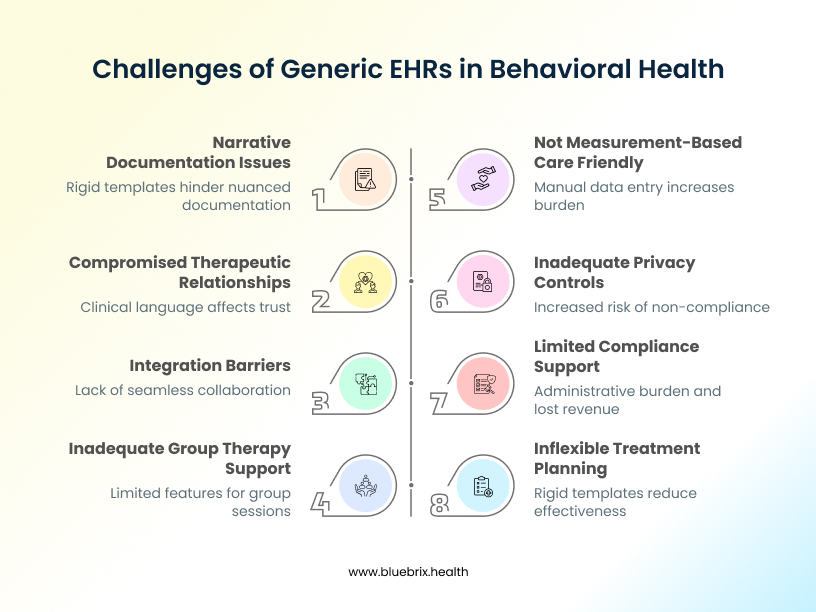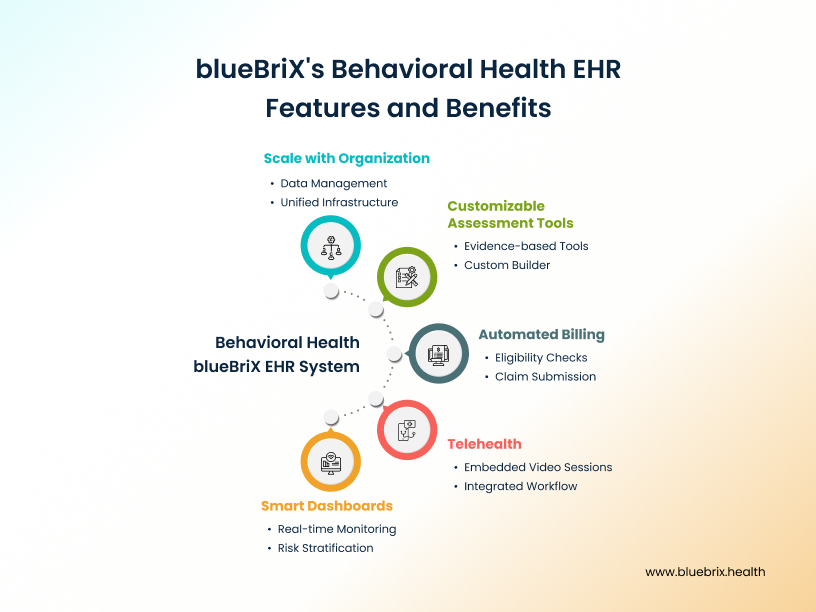While the healthcare industry has largely embraced digital transformation—with over 94% of hospitals successfully implementing electronic health records—behavioral health providers face a starkly different reality. Only 6% of mental health facilities and 29% of substance use treatment centers have adopted EHR systems, creating a digital divide that reveals why generic solutions fail to meet your specialized needs.
This stark adoption gap exists because generic EHRs were never designed for behavioral health workflows. You’re working with inflexible software designed for traditional medical practices, forcing you to spend more time wrestling with systems than caring for patients. These platforms often lack the customization options needed for specialized documentation and assessment tools, the specific privacy controls essential for highly sensitive behavioral health data, and the integration capabilities required for seamless care coordination. The result? Increased administrative burden, workflow disruptions, and the exhausting reality of making inadequate systems work for your complex needs. That’s precisely why you need a purpose-built system for behavioral health—one that reduces your administrative load and lets you focus on what you do best: providing exceptional patient care.
Why generic EHRs are failing your behavioral health practice
While generic EHRs promise efficiency, they’re creating more problems than they solve for you. From forcing rich clinical narratives into rigid templates to compromising the therapeutic relationships that drive successful outcomes, these systems weren’t built for your specialized workflows—and it shows. Let’s take a deeper look at each challenge.

Narrative documentation vs. Structured data
Behavioral health relies on nuanced, narrative-rich documentation to capture your patients’ experiences, therapeutic progress, and contextual factors that matter most. Yet generic EHRs force you to squeeze rich qualitative observations into rigid templates, losing the clinical meaning and context that drives your treatment decisions. The iterative nature of mental health diagnosis doesn’t fit standard codification requirements, making these systems clinically inappropriate for your work. This mismatch forces you to abandon the flexible, interpretive documentation approach essential to quality mental health practice, undermining your ability to communicate effectively and maintain care continuity.
For example, a generic EHR would capture the patient data as below:
Mood: Depressed (Yes/No)
Sleep: 6 hours
Appetite: Decreased
Suicidal Ideation: No
Whereas narrative documentation or clinician note would be more effective in behavioral health to get a better picture of the patient’s mental health:
“The patient described feeling persistently low and emotionally disconnected over the past two weeks, particularly after a recent job loss. She mentioned difficulty falling asleep due to racing thoughts and noted a significant drop in appetite. While she denied suicidal thoughts, she expressed feelings of hopelessness and withdrawal from her support network.”
Compromised therapeutic relationships
Trust, empathy, and open communication are the heart of every therapeutic relationship. Yet, generic EHRs often ignore these critical foundations. Clinical language meant for documentation can easily be misinterpreted by patients, potentially making them feel judged or misunderstood, threatening the very trust you’ve worked hard to build. To avoid this, you may be editing notes, reducing detail, or using overly objective language, sacrificing the nuance that gives your care meaning. And when the EHR interface pulls your focus during sessions, it shifts the dynamic from therapeutic to transactional. You’re left constantly navigating a difficult trade-off: between documenting thoroughly and preserving the relational connection that drives real healing and outcomes.
Integration barriers in multidisciplinary care
Generic EHRs promise seamless integration but become the villain when your behavioral health team tries to collaborate. Different clinical “languages,” documentation styles, and codes (DSM-5 vs. ICD-10) don’t translate across providers. Critical information gets trapped in silos when your therapeutic notes aren’t visible to psychiatrists, and medication adjustments don’t reach case managers. Without inter professional care planning tools or registry management, therapists are typically forced into fragmented workflows that compromise the integrated care their patients need.
Not enough support for group therapy
Generic EHRs lack dedicated features for managing multiple participants within a single session, forcing therapists to navigate cumbersome workarounds. This results in incomplete documentation, difficulty tracking individual progress within the group context, and increased risk of errors or gaps in care. The inefficiency compromises both clinical outcomes and operational workflows while consuming valuable time you could be spending on patient care.
Not measurement-based care friendly
Generic EHRs typically lack built-in, specialized assessment tools you need for measurement-based care (MBC) in behavioral health. This means you must manually distribute, collect, and score paper-based assessments, then transcribe the results into the EHR system. This process is time-consuming, increases the therapists’ administrative burden, and is prone to errors or lost data, ultimately undermining the effectiveness and reliability of your MBC workflows.
Inadequate privacy and compliance controls
Behavioral health data is governed by strict privacy regulations due to its heightened sensitivity, including details about mental health, substance use, and therapy notes. In addition to HIPAA’s Privacy, Security, and Breach Notification Rules, therapists may also need to comply with 42 CFR Part 2, which imposes even tighter controls on substance use disorder records. Generic EHRs usually lack the advanced access controls, granular consent management, and audit trails you need to meet these standards, increasing your risk of unauthorized disclosure and non-compliance. This makes them ill-suited for the unique confidentiality demands of your behavioral health practice.
Limited compliance and billing support
Behavioral health practices face unique regulatory and billing requirements, including specific documentation standards and reimbursement rules. Unlike standard medical billing that relies on ICD-10 codes, you need dual coding with both DSM-5 diagnoses and ICD-10, plus stricter privacy compliance including 42 CFR Part 2 for substance abuse treatment. Generic systems lack these specialized features, creating an increased administrative burden for therapists, delayed claims processing, and lost revenue for your practice. Without proper billing integration and regulatory support, behavioral health providers struggle to meet mandatory requirements while optimizing financial performance in an already resource-constrained field.
Inflexible treatment planning
Generic EHRs often rely on rigid, one-size-fits-all templates that fail to accommodate the personalized, evolving nature of your mental health care practice. Mental health providers struggle to plan and adjust individualized goals and interventions efficiently, leading to fragmented care and reduced treatment effectiveness. This inflexibility increases your administrative burden and limits your ability to respond to patients’ changing needs, ultimately compromising the quality of behavioral health services you provide.
Why customization matters in behavioral health EHRs?
Behavioral health care isn’t one-size-fits-all—and neither should your EHR be. From capturing complex patient histories to managing diverse treatment modalities, customization transforms your technology from a barrier into a true clinical partner that adapts to your unique workflows.
Personalized intake drives care
Personalized intake and documentation are important in behavioral health because every patient’s mental health journey is unique and often complex. Tailored intake forms allow you to capture detailed, patient-specific information—psychiatric history, substance use, and psychosocial context—right from the start. This enables you to better identify patient needs and history for more effective treatment planning, reduce errors and inconsistencies that could impact critical care decisions, and enhance patient engagement by making them feel understood and involved in their care.
Dynamic, individualized treatment planning
Flexible care templates adapt to each patient’s unique journey, with automated monitoring of shared goals and achievements to ensure treatment stays on track and compliant with care standards. This combination supports dynamic, personalized planning while maintaining consistency and regulatory adherence throughout the care process.
Group therapy management
Your behavioral health practice needs robust group therapy management capabilities since group sessions play a vital role in treatment. Your EHR should seamlessly support scheduling, documenting, and billing for multiple patients within a single session. You need tools that allow you to track individual progress within the group setting, create personalized notes for each participant, and easily access previous session data. This streamlines your billing process by automatically linking each patient’s participation to the appropriate billing codes, reducing the administrative burden while ensuring comprehensive documentation for every group member.
Integrated telehealth support
Behavioral health practice needs seamless telehealth integration to meet today’s healthcare demands and expand access to mental health services. Built-in telehealth capabilities allow you to offer remote counseling and therapy sessions through secure video conferencing, messaging, and virtual consultations—particularly valuable for reaching patients in rural areas or those with mobility challenges. This integration ensures you can provide continuous care without requiring facility visits while automatically capturing and storing all telehealth data, including appointment notes, recordings, and patient consent forms, directly in each patient’s record for comprehensive documentation and compliance.
Single source of truth
A purpose-built EHR acts as a single source of truth by integrating data from disparate systems—therapy notes, psychiatric assessments, case management updates, and peer support interactions—into one unified platform. This seamless data flow breaks down silos, ensuring every member of the multidisciplinary team has real-time access to the latest patient information. The result is a holistic, coordinated view of each patient’s journey, empowering better clinical decisions and improving outcomes.
blueBriX: A behavioral health EHR that actually speaks your language
Finally, an EHR designed specifically for behavioral health providers who refuse to compromise quality care. blueBriX understands your unique workflows, unique documentation requirements, and patient needs—delivering solutions that enhance rather than hinder your practice.

Scale with your organization
Whether you’re a solo practitioner or a large enterprise, blueBriX can serve both needs like a breeze. Our platform effortlessly manages increasing data volumes and complexity, supports multiple locations through unified infrastructure, and maintains optimal performance as your organization expands. blueBriX adapts to your growth without compromising functionality or speed, ensuring your EHR system grows alongside your practice.
Smart dashboards for proactive care
Gain clinical clarity with predictive dashboards that enable smarter, data-driven decisions. Monitor patient progress in real time, stratify risk levels for proactive intervention, track case trends to predict outcomes, and optimize resource allocation by assigning teams where they’re needed most. blueBriX transforms your data into actionable insights that drive better clinical outcomes and operational efficiency.
Telehealth without the hassle
blueBriX delivers comprehensive telehealth that goes beyond virtual visits with HIPAA-compliant, high-definition video sessions integrated directly into your workflow. Chart during sessions, access assessments, and adjust treatment plans without switching screens or disrupting patient interactions. Extend engagement beyond the clinic through self-assessments, progress tracking, and secure messaging that support continuous care between sessions—all managed from one unified platform with built-in scheduling and real-time clinical documentation.
Customizable assessment tools
Access 200+ evidence-based tools like PHQ-9, GAD-7, and C-SSRS ready with zero setup, plus create custom assessments in minutes using our intuitive drag-and-drop builder—no coding required. Configure formats, scoring, and layouts to match your clinical priorities, seamlessly integrate assessments with treatment plans to track trends, and customize print layouts with full control. Whether you’re using validated tools or building your own, blueBriX adapts to your evolving care needs without technical barriers.
Automated billing & revenue cycle management
blueBriX automates your entire revenue cycle from scheduling to payment—real-time eligibility checks, automatic claim scrubbing, direct submission without third-party tools, and automatic payment posting. Built-in rules engines eliminate manual processes while unified workflows sync clinical notes, codes, and billing instantly. Get fewer denials, faster reimbursements, and complete financial visibility through comprehensive dashboards—all within your EHR, no platform switching required.
blueBriX goes beyond basic EHR—it transforms your end-to-end practice
Beyond core EHR functionality, blueBriX extends its specialized capabilities to support diverse behavioral health settings and complex care coordination needs. Whether you’re managing multiple locations, supporting school-based programs, or addressing social determinants of health, blueBriX adapts to your unique operational challenges.
Centralized multi-location management
Designed for organizations of all sizes, blueBriX offers centralized dashboards for managing appointments, documentation, and billing across multiple locations. This ensures real-time access to patient records and consistent care delivery, regardless of site.
Registry and SDoH integration for holistic care
blueBriX also streamlines registry management and SDoH tracking, enabling you to efficiently manage patient cohorts and capture key social determinants right within the EHR. This integration supports targeted interventions, holistic care planning, and better outcomes for both individuals and populations.

